From virtual makeup try-ons to personalized skincare solutions, beauty brands leverage generative AI to enhance customer engagement, streamline production, and unlock unprecedented sales growth.
The global AI in beauty and cosmetics market reached a value of nearly $3.2 billion in 2023, growing at a compound annual growth rate (CAGR) of 14.3% since 2018. With projections to reach $7.8 billion by 2028, growing at a rate of 19.6%, it’s evident that AI is not just a passing trend but a cornerstone of the industry’s future.
With mobile commerce accounting for over 62% of beauty sales in key markets, integrating AI into digital strategies is no longer optional—it’s essential for survival and growth.
Top beauty players like Estée Lauder, Sephora, and Olay are not just following the trend; they are setting new benchmarks in customer experience. Sephora’s Pocket Contour, which uses AI to analyze facial features and recommend products, ensures customers find the perfect shade and fit, solving an issue that affects 70% of makeup buyers. Meanwhile, Olay’s Skin Advisor doubled its conversion rates globally, demonstrating the direct ROI potential of integrating AI. These success stories provide a roadmap for brands aiming to enter the generative AI space with solutions tailored to consumer needs.
As a beauty brand, your next step is clear: embrace GenAI to stay competitive and meet evolving consumer demands. With virtual assistants, personalized recommendations, and AR-enhanced shopping experiences proving their value, the opportunity to build customer loyalty and increase sales is massive. Whether it’s through a branded app or integrating tools like virtual try-ons, generative AI is your brand’s gateway to creating unforgettable, data-driven experiences that resonate with today’s tech-savvy beauty consumers.
Key benefits of AI & Generative AI for the beauty industry
Generative AI is reshaping the beauty industry, bringing unprecedented opportunities for innovation, personalization, and operational excellence. From transforming customer experiences to streamlining production, AI-powered tools are empowering beauty brands to redefine their strategies and exceed customer expectations.
Personalization at scale
Generative AI is enabling hyper-personalization in beauty products. From AI-powered tools like virtual try-ons (e.g., Sephora’s augmented reality makeup tools) to personalized skin analysis, consumers can experience tailored recommendations that improve shopping confidence. For instance, Avon’s adoption of AI/AR technologies boosted conversion rates by 320% and increased order values by 33%.
Enhanced marketing and customer engagement
Moreover, AI is revolutionizing how brands connect with their audiences. Personalized marketing campaigns powered by AI deliver a 30% higher ROI by understanding customer preferences and predicting trends. For example, tools like L’Oréal’s ModiFace technology provide customized skincare advice, enhancing customer loyalty and satisfaction.
AI-driven marketing campaigns have been shown to deliver higher returns on investment. Unilever’s Beauty & Wellbeing teams in Southeast Asia utilized AI to create relevant content, resulting in a 23% increase in ad recall and a 7% higher purchasing intent.
Efficiency in operations and sustainability
Generative AI supports beauty brands in streamlining production, reducing waste by 25% through optimized inventory management. Real-time AI-driven production monitoring ensures minimal downtime while boosting efficiency. Brands like Ulta Beauty have also leveraged AI to encourage online engagement, achieving a 2.5x increase in customer spending through their redesigned loyalty program.
Examples of Generative AI technology implementations in Beauty brands
Generative AI allows beauty brands to innovate across various touchpoints, from interactive product trials to data-driven inventory management. By integrating AI-powered solutions, companies can better meet consumer expectations, improve efficiency, and establish themselves as leaders in the digital beauty space.
Virtual try-on: transforming beauty eCommerce and mobile experiences
For beauty brands, virtual try-ons are not just a technological addition but a strategic imperative, elevating eCommerce and mCommerce platforms to meet modern consumer expectations for personalization and interactivity.
Virtual try-ons and diagnostics allow consumers to experiment with products, such as makeup or skincare, through digital simulations directly on mobile apps. This innovation bridges the gap between physical and digital shopping for beauty brands, boosting customer engagement, increasing sales, and reducing product returns.
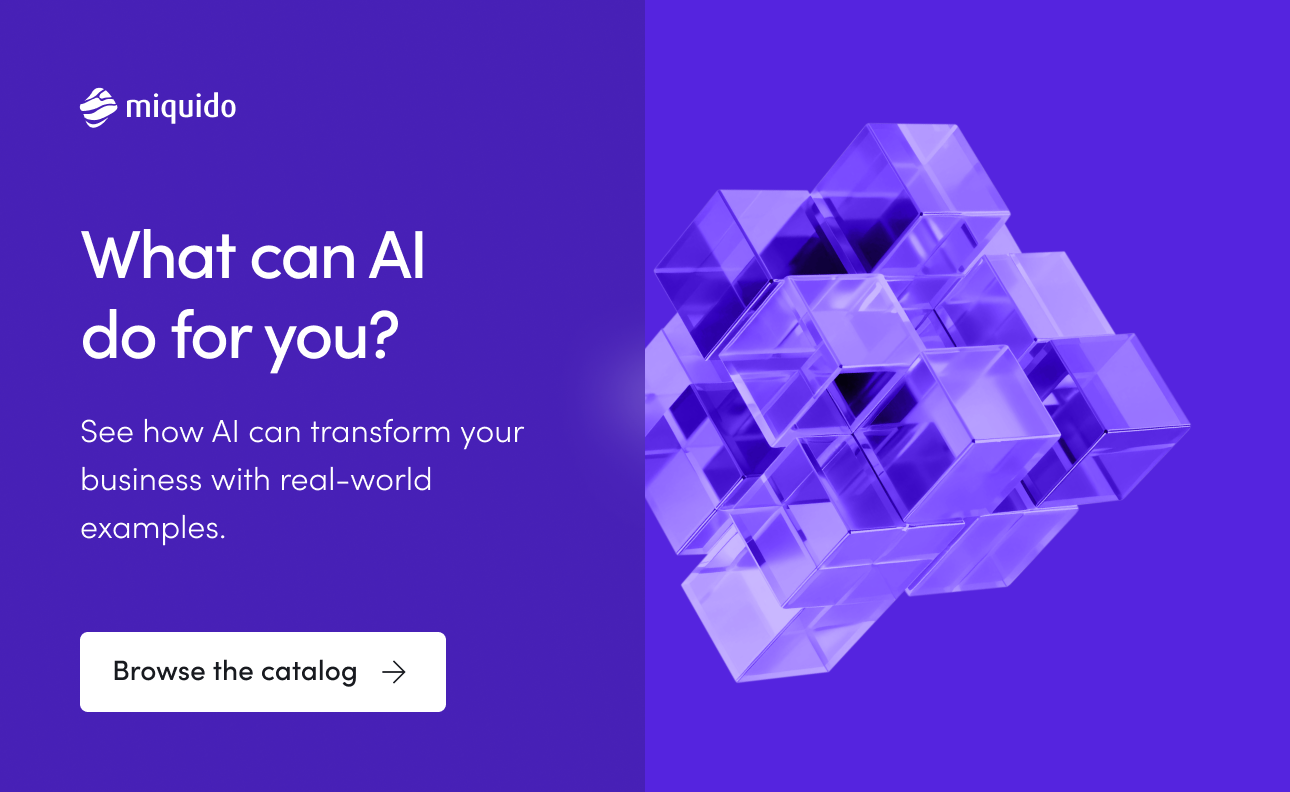
Business benefits for beauty brands
- Increased customer confidence: Virtual diagnostics provide highly accurate previews of product outcomes, empowering customers to make informed decisions without visiting a store.
- Higher conversion rates: By enabling personalized product recommendations and interactive try-ons, brands can significantly boost purchase intent and reduce cart abandonment rates.
- Operational efficiency: These tools minimize product returns by ensuring better customer-product matches, leading to cost savings and optimized inventory management.
Virtual-tryons case studies from top beauty brands
Perfect Corp’s Virtual Try-On Tools
Perfect Corp collaborates with over 500 brands, including Walmart, Target, and Estée Lauder, to integrate AI-driven virtual try-on tools into their platforms. The company, for example, utilized advanced AI deep learning algorithms to analyze an extensive database of 89,969 skin tones, covering a complete range from the lightest to the darkest shades. This allows customers to digitally experiment with products and get personalized advice, leading to a 320% increase in conversion rates and a 33% rise in average order values, making them a vital asset for any beauty e-commerce platform.
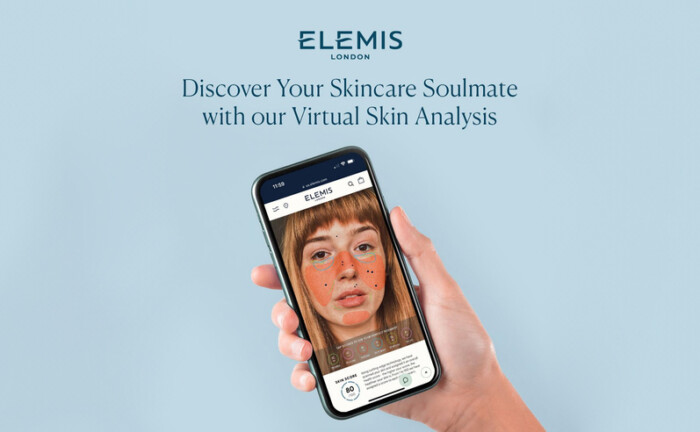
Estée Lauder’s Voice-Enabled Makeup Assistant
Estée Lauder has embraced AR and AI with its Voice-Enabled Makeup Assistant. This tool provides real-time, hands-free makeup tutorials, enhancing the user experience through personalized, guided product application. It combines facial mapping technology with responsive AR overlays to ensure precision and usability.
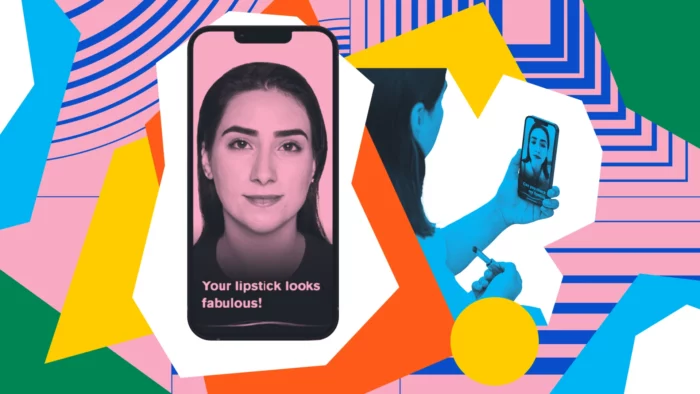
Moreover, this solution is designed to assist visually impaired users in applying makeup with precision. Leveraging AI and augmented reality, the app provides real-time voice guidance to ensure even application and offers corrections for smudges or uneven areas, enhancing accessibility and independence in beauty routines.
L’Oréal’s Modiface
L’Oréal’s Modiface technology lets users experiment with hair colours and makeup digitally, leveraging AI to deliver a personalized virtual try-on experience. This tool has demonstrated a significant impact, increasing conversion rates by 21% and encouraging users to explore beauty products more confidently. Modiface continues to enhance customer engagement by seamlessly integrating into eCommerce platforms.
Sephora’s Pocket Contour
Contour Sephora’s Pocket Contour app uses advanced facial analysis to identify users’ face shapes and provide tailored product recommendations. This technology offers step-by-step makeup tutorials, helping customers select and apply products that suit their unique facial features. Combining facial mapping with beauty education, Sephora enhances user confidence and fosters customer loyalty.
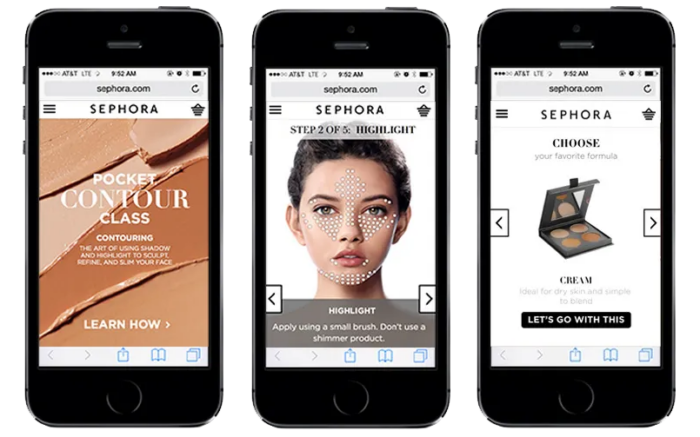
Using Generative AI tools, AI and VR for in-app personalized skin diagnostics
Leading brands like L’Oréal, Neutrogena, and Olay are embracing virtual reality (VR) and artificial intelligence (AI) to revolutionize personalized diagnostics, utilizing facial recognition, skin tone and type analysis, as well as hair color and texture assessments. These innovations enable tailored product recommendations, fostering deeper customer engagement and trust in digital beauty platforms.
Cetaphil AI Skin Analysis
Cetaphil’s AI Skin Analysis leverages a comprehensive database of over 70,000 skin images to evaluate users’ skin conditions. By uploading a selfie to the platform, users receive personalized skin assessments and product recommendations tailored to their specific needs. This tool educates users about sensitive skin care while enhancing their engagement with Cetaphil’s product line.
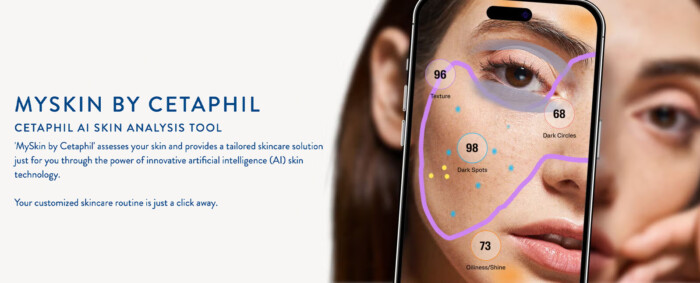
Neutrogena Skin360
Neutrogena’s Skin360 app incorporates an AI-powered assistant (NAIA™) to track users’ goals and recommend personalized skincare routines. Beyond product suggestions, the app monitors stress levels, exercise habits, and sleep quality, offering a holistic approach to skincare. By integrating these insights, Skin360 helps users stay on track with their personalized routines and improve overall skin health.
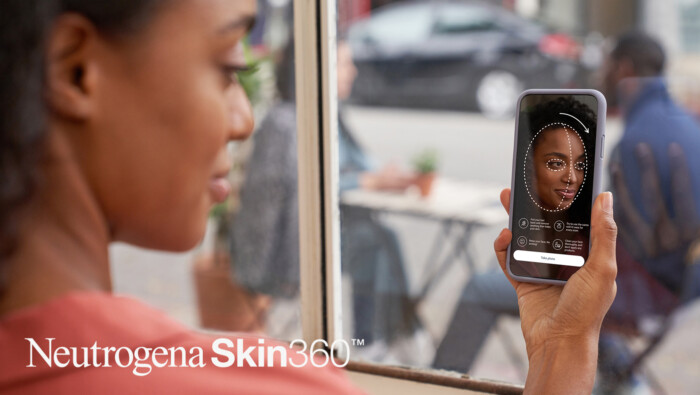
Chatbots for beauty and skincare brands
Chatbots are transforming the beauty industry by offering customers personalized, convenient, and engaging interactions. For instance, Sephora’s chatbots provide tailored product recommendations, answer customer queries, and even help schedule store visits, resulting in higher conversion rates and enhanced customer satisfaction.
Similarly, Avon’s “Avon On” app empowers representatives with tools to manage customer communications and inventory, leading to a 24% annual increase in app usage. These AI-driven assistants not only streamline the shopping experience for customers but also drive measurable business outcomes, including increased engagement, improved efficiency, and higher sales.
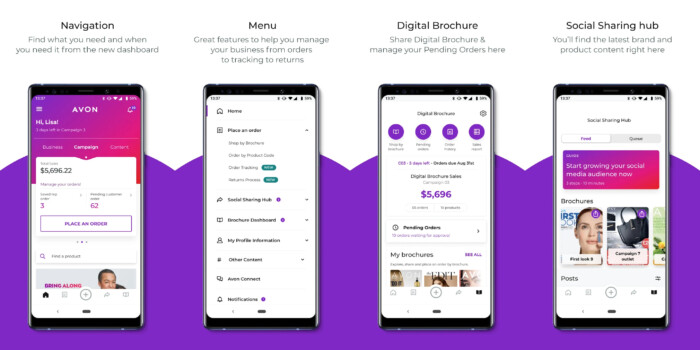
Examples of Marketing initiatives with chatbots
Chatbots are not only enhancing customer service but also reshaping marketing strategies for beauty brands through creative collaborations. Covergirl successfully leveraged chatbot technology in partnership with influencer Kalani Hilliker, creating a simulated conversation using Automate and The Amplify influencer marketing platform.
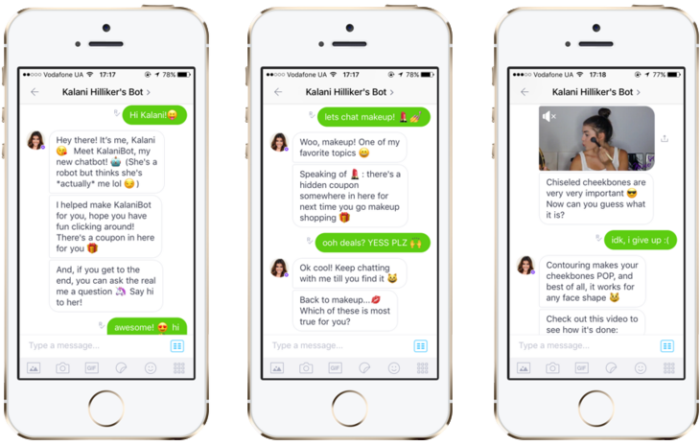
This campaign demonstrated the power of chatbots in driving engagement, with 48% of interactions leading to coupon deliveries and 51% of recipients clicking on the coupons. By merging chatbot capabilities with influencer marketing, brands like Covergirl are boosting customer interaction, amplifying campaign reach, and generating measurable business outcomes.
Trend prediction & marketing advertising: building brand loyalty
Generative AI is ushering in a new era of creativity and precision in trend prediction and advertising for beauty brands. By leveraging AI algorithms and customer data, companies are crafting personalized campaigns that resonate deeply with consumers across multiple global markets. This approach not only enhances customer experience, contributing to more user generated content but also strengthens brand loyalty by ensuring marketing efforts align with evolving consumer sentiment and preferences.
Prada, for instance, used AI to design visually striking Instagram campaigns, blending human creativity with technical expertise to supercharge content creation. These AI-generated visuals effectively captured audience attention, showcasing the technology’s potential to drive engagement and elevate a brand’s design direction.
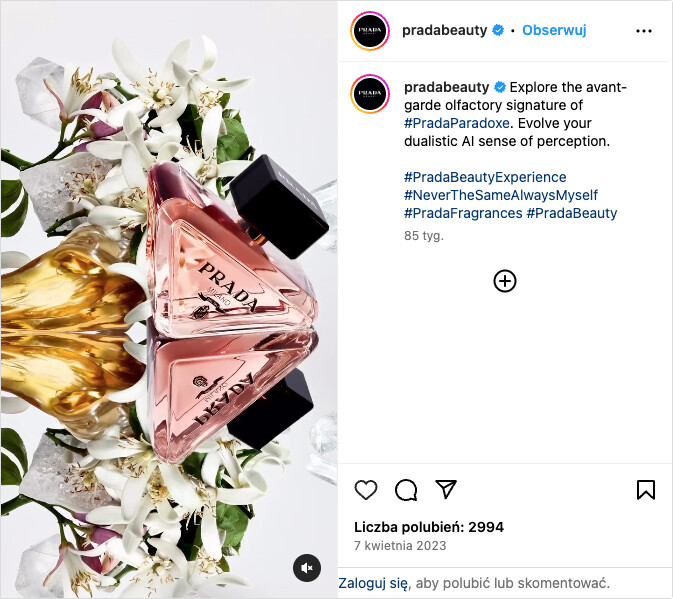
Similarly, Olay Skin Advisor utilized AI tools to analyze consumer insights, tailoring targeted marketing campaigns that significantly boosted user engagement and reduced bounce rates.
Through AI-powered tools, beauty companies can predict trends, generate compelling marketing materials, and adapt to volatile market demands, ultimately meeting consumer expectations while reinforcing their market position. This seamless integration of technology with creativity is a big selling point, offering brands an innovative pathway to connect meaningfully with their audience.
Mobile commerce integration boosting customer experience
Platforms like Skin + Me analyze customer skin images to suggest suitable products, enhancing personalization. However, newer technologies are pushing boundaries further, using generative AI to simulate and predict how an individual’s skin might change over time with specific skincare regimens.
For instance, SkinGPT, developed by the AI start-up HautAI and used by businesses like ULTA Beauty, leverages generative AI to create dynamic skin simulations. This allows users to visualize the potential impact of various products on their skin, empowering informed decision-making and deepening customer engagement. By integrating these features, brands are not only meeting consumer expectations for personalization but also revolutionizing how skincare routines are designed and marketed.
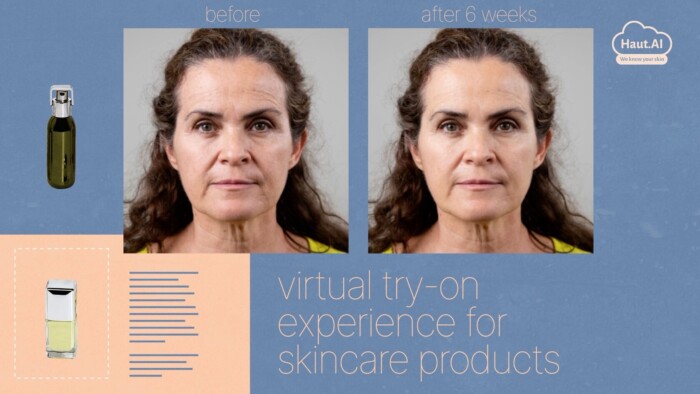
Empowering beauty brands with Generative AI solutions
Generative AI is revolutionizing the beauty industry, offering unparalleled opportunities for innovation, personalization, and efficiency. AI-powered virtual try-ons, personalized skin diagnostics, and chatbots redefine customer engagement.
Imagine developing a bespoke app that utilizes advanced facial recognition to recommend tailored skincare regimens or an AI-driven loyalty platform that uses predictive analytics to boost customer retention. From streamlining operations with real-time production monitoring to creating enhanced shopping experiences, the potential to transform your brand’s digital strategy is immense.

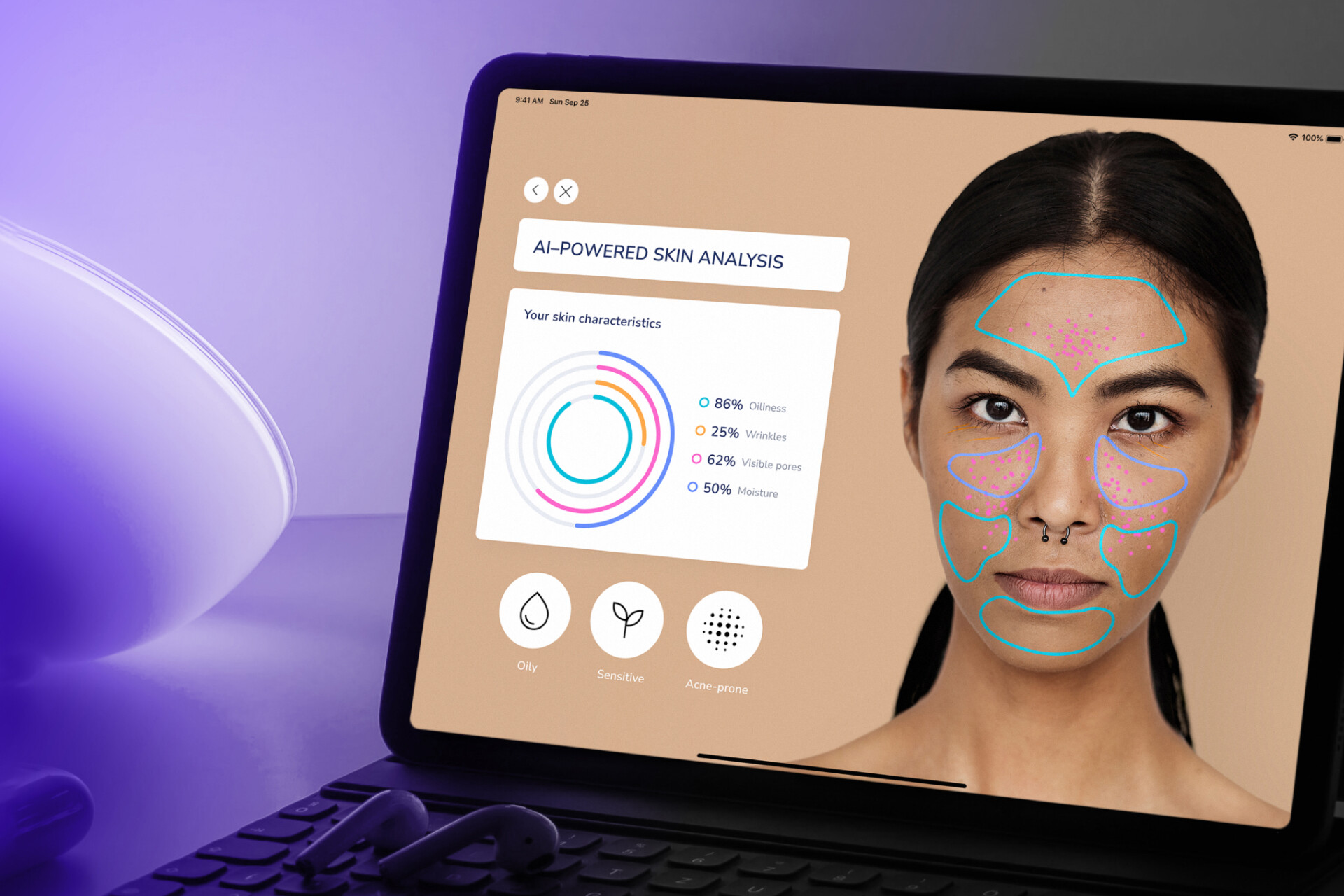


![[header] top generative ai companies in 2025 min](https://www.miquido.com/wp-content/uploads/2025/09/header-top-generative-ai-companies-in-2025-min-432x288.jpg)

![[header] top ai use cases in ecommerce b2b from manufacturing to foodtech](https://www.miquido.com/wp-content/uploads/2025/09/header-top-ai-use-cases-in-ecommerce-b2b_-from-manufacturing-to-foodtech-432x288.jpg)
![[header] top 5 use cases for autonomous delivery in foodtech today](https://www.miquido.com/wp-content/uploads/2025/08/header-top-5-use-cases-for-autonomous-delivery-in-foodtech-today-432x288.jpg)